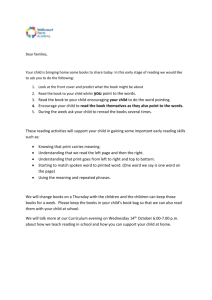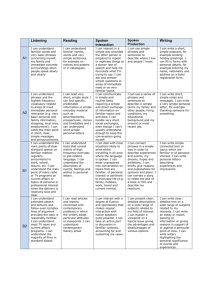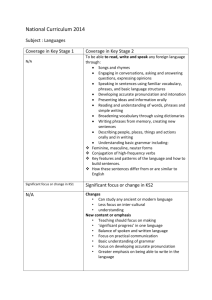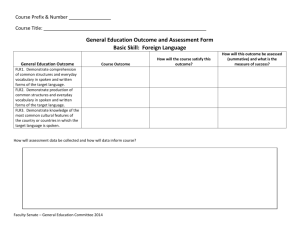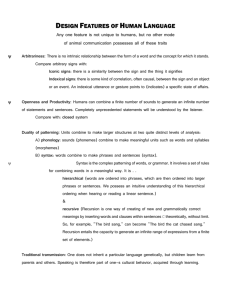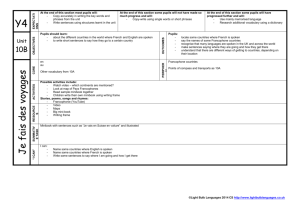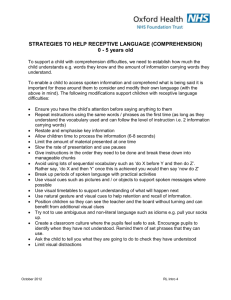DOC - Primary Resources
advertisement
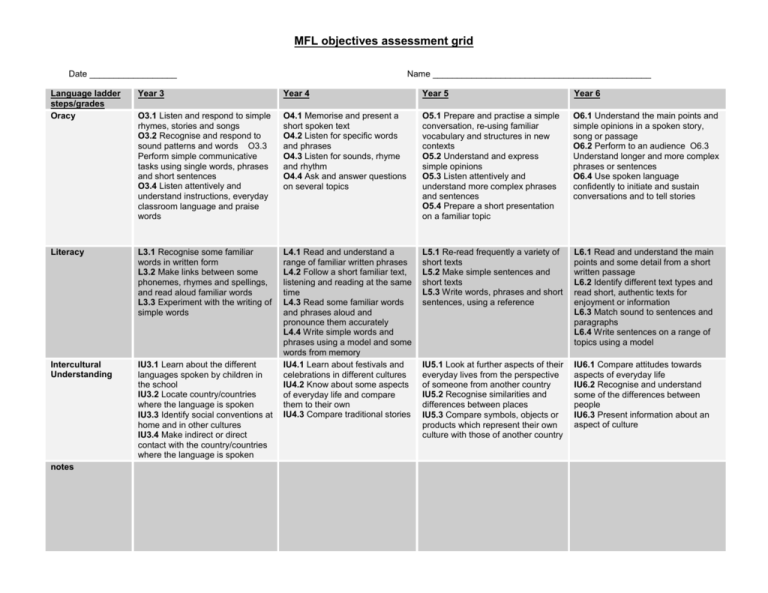
MFL objectives assessment grid Date __________________ Name _____________________________________________ Language ladder steps/grades Oracy Year 3 Year 4 Year 5 Year 6 O3.1 Listen and respond to simple rhymes, stories and songs O3.2 Recognise and respond to sound patterns and words O3.3 Perform simple communicative tasks using single words, phrases and short sentences O3.4 Listen attentively and understand instructions, everyday classroom language and praise words O4.1 Memorise and present a short spoken text O4.2 Listen for specific words and phrases O4.3 Listen for sounds, rhyme and rhythm O4.4 Ask and answer questions on several topics O5.1 Prepare and practise a simple conversation, re-using familiar vocabulary and structures in new contexts O5.2 Understand and express simple opinions O5.3 Listen attentively and understand more complex phrases and sentences O5.4 Prepare a short presentation on a familiar topic O6.1 Understand the main points and simple opinions in a spoken story, song or passage O6.2 Perform to an audience O6.3 Understand longer and more complex phrases or sentences O6.4 Use spoken language confidently to initiate and sustain conversations and to tell stories Literacy L3.1 Recognise some familiar words in written form L3.2 Make links between some phonemes, rhymes and spellings, and read aloud familiar words L3.3 Experiment with the writing of simple words L5.1 Re-read frequently a variety of short texts L5.2 Make simple sentences and short texts L5.3 Write words, phrases and short sentences, using a reference L6.1 Read and understand the main points and some detail from a short written passage L6.2 Identify different text types and read short, authentic texts for enjoyment or information L6.3 Match sound to sentences and paragraphs L6.4 Write sentences on a range of topics using a model Intercultural Understanding IU3.1 Learn about the different languages spoken by children in the school IU3.2 Locate country/countries where the language is spoken IU3.3 Identify social conventions at home and in other cultures IU3.4 Make indirect or direct contact with the country/countries where the language is spoken L4.1 Read and understand a range of familiar written phrases L4.2 Follow a short familiar text, listening and reading at the same time L4.3 Read some familiar words and phrases aloud and pronounce them accurately L4.4 Write simple words and phrases using a model and some words from memory IU4.1 Learn about festivals and celebrations in different cultures IU4.2 Know about some aspects of everyday life and compare them to their own IU4.3 Compare traditional stories IU5.1 Look at further aspects of their everyday lives from the perspective of someone from another country IU5.2 Recognise similarities and differences between places IU5.3 Compare symbols, objects or products which represent their own culture with those of another country IU6.1 Compare attitudes towards aspects of everyday life IU6.2 Recognise and understand some of the differences between people IU6.3 Present information about an aspect of culture notes
